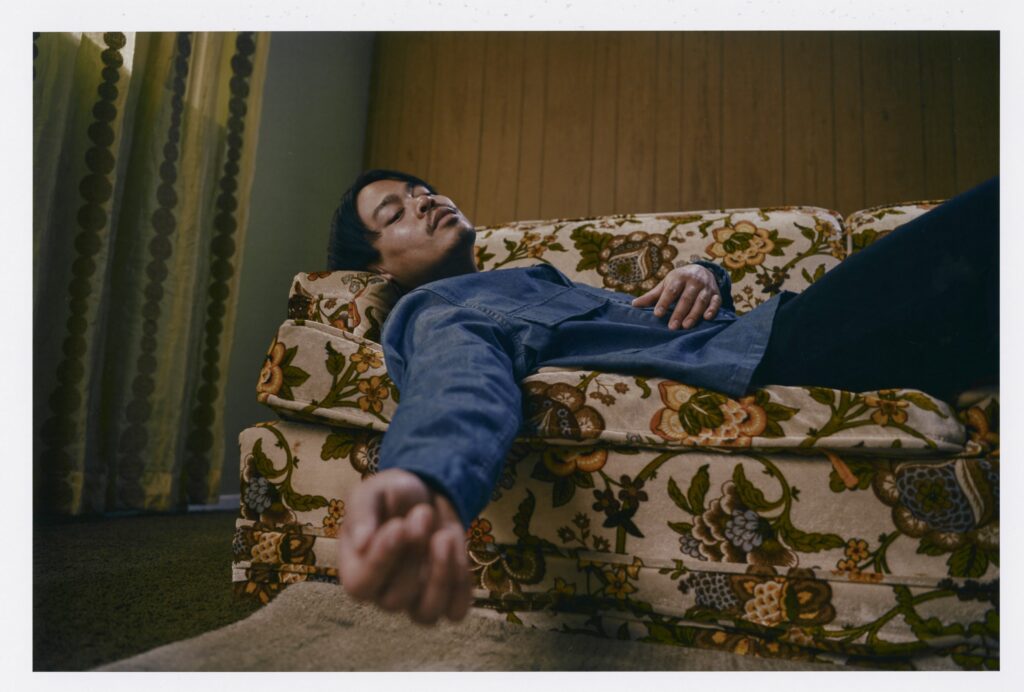Labit Embraces The Ups and Downs of Growing Up in “SOL”

Some people argue that an artist’s sophomore release makes or breaks their career, but Labit’s very own second album, SOL, easily proves he’s here to stay. Since his debut as a solo artist in 2019, the Filipino American singer-songwriter has continued to reach new highs, from the waltz-y tune “Someday Faraway” reaching more than 13 million streams on Spotify to making it to the Top 5K indie artists in the world per Chartmetric. Now, he tries his hands at genres previously unexplored and perfects his signature sound in the 18-track album, released on October 17.
At a glance, the amount of tracks may be intimidating, but it’s actually a feature, not a bug. From straight-from-the-heart love songs to tunes of growing pains, there’s a lot to unpack and take in from this record. A week ahead of the album’s launch, EnVi connected with Labit via Zoom to discuss the musical philosophy, lyricism, and creative direction of SOL and beyond.
Making Sense of SOL
In the album’s cover art, Labit — real name Stephen Ordoñez — solemnly sits on a well-decorated floral couch, eyes focused on the wooden floor beneath him. The lights are dim; bright enough for one to see everything, but not exhaustingly vibrant that it takes away from the focal point. Yet it is deceptively simple; the shot alone exudes not just nostalgia, but also both hope and despair. These emotions are what Labit delivers in SOL, titled after his late grandmother, Solita.
“We had a really strong relationship, and she meant a lot to me,” the 33-year-old artist explained. “It just felt like the right thing to do — naming it after her — because she was the one who kept everything together into this one cohesive album, [the] lessons she taught me.”
Indeed, every song in the album sounds like the snippets of life a grandson would share with his grandmother. For instance, in the opener “STAY AWHILE,” it’s not hard to interpret the track not just as a testament of Labit’s romantic devotion, but also to the good memories he had with her. On the opposite end of the tracklist is the orchestral title track, where he acknowledges the great impact she has on his life: “Every place I go / There’s a space I hold / Everywhere, I feel you smiling / And I only live for you.” It’s no surprise that these tracks are the ones Labit looks forward to being public the most.
Traces of Grandma Sol also appeared in the music video for “PARALLEL,” a track about the rush of recognizing an unexpected yet unreachable romance. An exact replica of her car — a Buick LeSabre from the ‘90s — becomes the centerpiece of the video, with Labit and other folks from different walks of life singing and dancing inside it. About the car, Labit fondly recalled how she would pick him up from school and lounging at her one-bedroom apartment. “I remember when we were filming it, just being in the back seat of that car again… that’s where I would sit as a kid, because I couldn’t sit in the front. That made it so sentimental for me.”
There’s A Reason for Every Break and Goodbye
Romance manifests in different ways in SOL, and Labit isn’t afraid to display its uglier sides. After the ambient opener “STAY AWHILE,” Labit immediately sings of his dependence on an emotionally unavailable partner in “BREAK!” His frustration on this imbalance continues in the wittily titled “PRETTY,” its soft pop-rock arrangement sharply contradicts his desperate attempts at righting his wrongs; never mind that they’re not good for each other. But the pinnacle of the relationship is wholly addressed in “CODEPENDENT,” the word Labit uses to describe the dynamic: “I’m codependent on your independence.” He realizes that even though his reliance on his lover isn’t inherently wrong, it is hurting both of them in the long run.
Fortunately, things got better. With the alternative rock track “WHO WE WERE,” Labit closes the chapter he had with a past partner. While recognizing that he and this person won’t ever work out, he still acknowledges their role in shaping him into who he is today. “I thought I’d always want you / And we could make it work / I thought that you’d come around / And we’d have time to burn / Now when I think about us / I can say for sure / I know I am who I am / Because of who we were,” he sings. Following this sobering realization is the groovy, R&B-inspired “WYL,” short for “Whatever You Like.” Beyond its danceable music, the song vividly portrays the passion he and his lover have for each other.

The celebration of this new love doesn’t stop at the sensual. In “LEADS (ME TO YOU),” which relies on a catchy five-note motif, he reminisces on how the things he’s seen and the events he’s experienced have brought him to his loving, understanding partner. Even if he had to hurt in the past, it was ultimately worth it. This gratitude is also expressed in “BETTER.” This time, despite “get[ting] high and feel[ing] low at the same time,” he’s much more self-aware of his mental health and how he’s relating to others. “You got me when it’s dark and it’s too much / You catch me every time I throw it out / Every time we touch, in the moment, it’s enough / There’s no problem, it’s just us,” he croons. And in “FEBRUARY,” the origin story of this relationship is revealed. In the middle of the night, Labit’s partner suddenly confessed their feelings, and things changed for the better since then. Sincere as always, he returns their “I love you” and hopes to keep the love aflame forever.
Cleaning Out the Fridge
There’s more to SOL aside from stories of heartbreak and redeeming yourself in a healthy relationship. In “CLOUD,” the album’s fourth track, he discusses mental health head-on. Likening one’s struggles to a rain cloud that consistently hangs over their head, he offers listeners a place of comfort, because he, too, has gone through the same hardships. “You know, I’m not one to give you advice / But I’m listening / And it sounds like you could really use a hug and a shoulder to cry on / You could really use a light when you wanna die,” he sings. As idealistic as it may sound, he reassures them that the sun is just around the corner — it’ll be okay in the end.
Following the aforementioned warm hug of a song is a string of equally cathartic and heart-wrenching tracks. Right after “CLOUD,” listeners are greeted by the pop-punk song “ALL MY PLANTS ARE DYING,” once again displaying the juxtaposition of its energetic arrangement and depressing lyrics. There’s something intriguing with how closely Labit sings the word “plants” to the word “friends,” adding a layer of fear of losing community to his dissatisfaction with life. Next, there’s “CLICK,” which sees Labit at his lowest yet. The song’s title is repeated quietly, reflecting his faint, but persistent hope that life will improve eventually. In “BET,” he provides a snapshot of his old life before doing music full-time — as an exhausted minimum wage food service worker, he knows that he needs to get help, but not even 24 hours a day is good enough for him to “waste.”
Labit is highly aware that these topics can be tough to digest, even through music.“I feel like it’s really easy not to talk about those things, especially when you’re going through a hard time. It can be scary to really open up to anybody — let alone put it in a song — but it’s really hard to ask for help when you need it,” he mused. “So… I think I’ve just been trying to do better at being completely myself and completely honest with myself, and when I need help [or] I’m going through something hard.” The importance of catharsis and vulnerability takes the center stage in “CLEANING OUT THE FRIDGE,” an acoustic-guitar-and-piano track featuring Canadian singer-songwriter Emily Rowed. As the two artists put it, “Tell me everything you’ve ever said / I’m trying to make sense of the mess we’re in / I’m knocking down the walls / And cleaning out the fridge / I wanna know it all and then know you again.”
My Life Was a Blur, But We Always Made It Work
SOL is a commemoration of life at its highest and lowest, but one song that represents the middle point of those extremes stands out: “MANGOES AND RICE.” Released ahead of the album on May 16, it is dedicated not just to his younger sister Melanie — whose name is mentioned in the song — but also to the youths of the Asian diaspora. “It’s a conversation with my sister about remembering our childhood and how we were raised, and using that knowledge in present situations,” Labit shared in a press release. From lack of representation in the media to academic pressure, living as a Filipino American isn’t easy. But like the titular snack, there is always comfort in the simplest things in life.
The track’s music video — or short film, even — is also particularly meaningful. With an almost-seven-minute runtime, the video is not something to be missed, especially in an era where people’s attention spans are getting shorter than ever. (Heck, a minute of the video is dedicated to the actress playing Melanie trying to parallel park!) “I try my best not to do things just because other people do [them],” Labit commented. “That’s a very real thing that you just said [about] people’s attention spans are so short nowadays, and you know, the shorter the song, the better. But that’s just not something I would bring into my art.” Simply put: authenticity is key.
After SOL is officially out to the world, Labit is set to promote the album through an L.A. showcase on October 18 and hopefully more. “I’m going to be taking a lot of time just to let these songs sit and resonate with people,” he explained. But that’s not all — his eyes are already set to the future. “[I’ll] take a mini break eventually, and then just right back at it with writing. I’m in the middle of writing the next… things. It’s a fun process right now. I feel like you can mess up as many times you want. […] I feel like a kid, especially during this process; alright, I have no idea what the new stuff is gonna be, [but I’m] just trying things and seeing what sticks.”
His unexplored genre of choice? “Folk. […] Just the stories you’re able to tell… It’s something that I haven’t really done for myself, but I’ve always loved it, so… who knows?”
Being a seasoned storyteller himself, that sounds about right.
Follow Labit on Instagram, TikTok, and YouTube to stay on top of his activities! SOL is available to stream on Spotify, Apple Music, YouTube Music, and more.
Looking for more features with up-and-coming artists from the Asian diaspora? Check out our interview with the Indonesian band, Reality Club!



